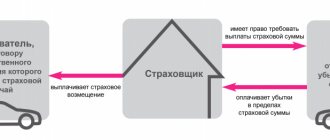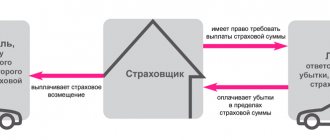Differences between recourse and subrogation
To understand what the difference is between subrogation and recourse, let's start with examples in the Civil Code of the Russian Federation (hereinafter referred to as the Civil Code of the Russian Federation):
- recourse - the right of recourse of the person who compensated for the harm to its causer (for example, to an employee who caused harm in the performance of his labor function, clause 1 of article 1081 of the Civil Code of the Russian Federation);
— subrogation — transfer of the creditor’s rights under an obligation to another person, namely the transfer to the insurer of the creditor’s rights to the debtor, due to whose actions the insured event occurred (subclause 4, clause 1, article 387 of the Civil Code of the Russian Federation).
Both cases are aimed at implementing the principle of excluding unjust enrichment, that is, to prevent a situation where another person pays for the person who caused the harm, and he is unreasonably excluded from the number of obligated subjects.
At the same time, the difference between subrogation and recourse is that the right of recourse arises as such at the moment the creditor’s claims are satisfied by a person who is not the tortfeasor, and the rights of the person who satisfied the creditor’s demands, in the case of subrogation, are not new rights, but transferred to him rights of the creditor, in connection with which subrogation is an example of a change in persons in an obligation.
There is a point of view in the doctrine that the differences between recourse and subrogation are that:
- subrogation is a special case of recourse;
- subrogation is an innovation of the Civil Code of the Russian Federation, and the concept of recourse existed before.
Read about the nuances of recourse in bankruptcy cases in our article “When recourse against the insolvency administrator who caused the losses, the insurer must prove the intentional nature of the insolvency administrator’s actions.”
Concepts of subrogation and recourse
The institutions of recourse and subrogation have been known for a long time and are actually used in civil legal relations. Below we have tried to define these concepts in as simple a language as possible.
Regression
Recourse means the right of recourse (recourse) of a person who has compensated for damage caused by another person (an employee in the performance of official, official or other labor duties, a person driving a vehicle, etc.) to this person in the amount of compensation paid .
If we consider recourse using the example of insurance under compulsory motor liability insurance, then the claim of the injured person against the person who caused the harm passes to the insurance company that made the insurance payment in the amount of the payment made to the victim.
Cases in which the insurance company may make recourse claims include the following:
- intentional infliction of harm to the life or health of the victim;
- driving a vehicle without a license or while intoxicated;
- the culprit fled the scene of the accident, etc.
The insurer can also file a recourse claim. This is possible, for example, if the insured event occurred as a result of a malfunction that occurred after a technical inspection and receipt of a diagnostic card. In this case, a recourse claim is filed with the technical inspection operator.
Subrogation
Subrogation is the transfer of the insured's rights to compensation for damage to the insurer. This means that if the insurance company has paid the insurance compensation, then within the limits of the amount paid, the right of claim that the insured has against the person responsible for the losses compensated as a result of insurance is transferred to it. This is a general rule for the transfer of rights that operates by default, for example, in the absence of subrogation provisions in the contract. But if the insurance contract provides for other conditions, then the contract has priority. However, a provision of the contract that excludes the transfer to the insurer of the right of claim against the person who intentionally caused losses will always be void.
The use of subrogation can be considered in the following example. The insurer paid compensation under a voluntary property insurance agreement (hull insurance agreement). In this case, the amount of compensation paid exceeds the insured amount under the MTPL agreement. In this case, the insurer, by way of subrogation, along with the claim to the insurance organization obligated to make an insurance payment in accordance with the MTPL Law, receives the claim to the tortfeasor in excess of this amount.
However, the consideration of cases on subrogation claims has certain features. If, when considering a case on a subrogation claim, it is established that the insurance company of the harm-cauter paid insurance compensation under the compulsory motor liability insurance agreement, the court must determine which of the insurers (plaintiff or defendant) made the payment earlier.
In the event that the insurance compensation under the compulsory motor liability insurance agreement was paid earlier than the insurance compensation under the comprehensive insurance agreement, the subrogation claim against the insurer of the harm causer is not subject to satisfaction.
If the insurance company under the comprehensive insurance agreement made a payment earlier than the insurer of the tortfeasor, the claim is subject to satisfaction, unless it is established that the insurance company that received the subrogation claim did not properly notify the insurer (insurance company) of the tortfeasor about the subrogation that occurred.
What is the difference between recourse and subrogation and assignment?
When resolving the question of how recourse differs from subrogation, the problem of distinguishing them from another related category - assignment - often arises. Under cession, according to Art. 388 of the Civil Code of the Russian Federation, refers to the assignment of the right of claim.
Cession and subrogation are united by the fact that both of these institutions are types of transfer of the rights of the creditor to another person. However, their difference lies in the fact that subrogation is one of the types of transfer of the creditor’s rights to a third party on the basis of law (Article 387 of the Civil Code of the Russian Federation), and assignment is an assignment of a claim, permitted if it does not conflict with the requirements legislation (clause 1 of article 388 of the Civil Code of the Russian Federation).
At the same time, according to paragraph 2 of Art. 387 of the Civil Code of the Russian Federation, relations regarding the replacement of a creditor by force of law can, as a general rule, be regulated by provisions on assignment. On the assignment of the right of claim
Difference between subrogation and subrogation in simple words
Based on the above, we note that the difference between subrogation and recourse can be expressed in simple words as follows. With subrogation, the creditor is replaced, and with recourse, a completely new right arises that did not exist before.
Often the distinction between the concepts under consideration is given in judicial practice. Thus, in the resolution of the 17th AAS dated July 26, 2017 No. 17AP-7590/2017-AK in case No. A60-6971/2017 the following differences are given:
- in case of recourse, a new obligation arises and there is no change of persons in obligations;
- recourse excludes the application of Ch. 24 of the Civil Code of the Russian Federation and Art. 965 Civil Code of the Russian Federation;
- recourse arises from tort (causing harm), and subrogation arises from contract (insurance relations);
- in case of recourse, in addition to the relationship between the debtor - the tortfeasor and the creditor - the victim, a relationship arises between the debtor - the person responsible for the losses, and the creditor - the person who compensated for the losses.
On our website you will also find explanations in simple words and other terms. In particular, in the articles:
- “Barter - what is it in simple words?”;
- “What is acceptance in simple words?”;
- “What is this - an offer - in simple words?”
Table of recourse and subrogation ratio
To summarize the various positions regarding the relationship between recourse and subrogation, we present a table of the differences between these concepts.
| № | Regression | Subrogation |
| 1 | New Commitment | Transfer of an existing right of claim of a creditor |
| 2 | Regulated by the general norms of the Civil Code of the Russian Federation | A special regulatory regime has been established (in particular, Article 965 of the Civil Code of the Russian Federation) |
| 3 | The limitation period is calculated from the moment the creditor’s claims are satisfied by the person who received the right of recourse | The statute of limitations is calculated according to the rules of the Civil Code of the Russian Federation in relation to the main obligation |
| 4 | Regulated mainly by mandatory norms | As a general rule, discretionary regulation is used |
| 5 | Subrogation as a term was introduced by the Civil Code of the Russian Federation, while recourse existed in legislation before (opponents of this approach point out that the construction of subrogation was used in law, despite the absence of the term) | |
| 6 | Subrogation is a special case of recourse (discussion position) | |
| 7 | It is noted that it is possible to transfer the right of recourse to another person, including by assignment or subrogation | |
| 8 | In relation to insurance, recourse is limited to a narrower circle of persons | |
| 9 | The creditor in a subrogation relationship is obliged to perform certain actions in relation to the person receiving the rights of the creditor, for example, transfer documents or provide the necessary information | |
The distinction proposed in the table is not unconditional and is debatable (for example, paragraph 6). The list is not exhaustive; doctrine and practice may provide other grounds for comparison.
Insurance subrogation
Translated from Latin, this term means replacement. The principle of subrogation in insurance means the transfer of the right of claim and applies only to property insurance. Simply put, the rights of the policyholder are transferred to the insurer, which is essentially equivalent to replacing the creditor.
If the insurance company compensates for damage in connection with the occurrence of an insured event, it has the right to make similar demands against the guilty party. This transfer of the right to compensation for damage is enshrined in Article 965 of the Civil Code of the Russian Federation. Due to the fact that such a replacement is possible only within the framework of compensation for property damage, insurance subrogation does not apply to personal life and health insurance of citizens.
The right to subrogation arises only after the insurer has paid compensation to the injured party. Then claims for compensation for the damage incurred are redirected to the perpetrator on the basis that the right to claim from the beneficiary (the policyholder) is transferred to the insurer.
We invite you to read: Eviction of persons who refused privatization
For example, a person entered into an apartment insurance contract, including against flooding. When an insured event occurs, the insurer pays the amount of compensation to the injured person under the contract, after which it makes similar demands on the neighbors or the management company (depending on who is the cause of the flooding of the insured person’s apartment).
By the way, you can read more about insuring an apartment against flooding here https://tvoipolis.online/5772-strahovka-ot-zatopleniya-kvartiry-sosedyami
A similar scheme is used to resolve situations in the field of car insurance. The insurer pays the amount of damage to the client injured in the accident, after which it receives the right to demand compensation for the damage incurred from the person responsible for the accident instead of the insured. Therefore, in the event of an insured event, the beneficiary (policyholder) is obliged to provide the insurer with all the necessary documents, expert opinions and other evidence confirming the right to compensation for the damage incurred.
In turn, the insurer, after fulfilling its obligations to the injured party, transfers the claim for compensation for the damage incurred to the guilty party solely within the amount of the payment made.
Important! If the insured has waived his own right of claim against the perpetrator, or due to the fault of the insured it is impossible to exercise such a right, the insurer has the right not to pay compensation for damage in full (or in the relevant part), or to return the amounts already paid.
If harm is intentionally caused in order to receive an insurance payment, the culprit will bear responsibility, since in such a case the exclusion of the right to transfer claims to the insurer is unacceptable on the basis of clause 1, art. 965 of the Civil Code of the Russian Federation.
Assignment, subrogation and recourse in the resolution of the Plenum of the Armed Forces of the Russian Federation dated December 26, 2017 No. 58
As we noted earlier, Resolution No. 58 contains a block of clarifications of judicial practice that combines assignment, subrogation and recourse. The clarifications relate in particular to the following:
- An agreement on the assignment of the right of claim in relation to insurance payment is concluded if it is possible to accurately determine in relation to which right the assignment was made. Moreover, if the exact amount of the assigned right is not determined in the agreement, it can still be considered concluded (clause 69).
- Transfer of the rights of the victim is possible only after the occurrence of an insured event (clause 70).
- If the insurer has paid an amount under a voluntary insurance agreement that exceeds the amount of payment under a compulsory insurance agreement, then by subrogation it may recover both the amount payable under the MTPL legislation from the insurance company obligated to make this payment, and the difference between these amounts from the tortfeasor (paragraph 74).
Would you like to study Decree No. 58 in more detail? Get free access to ConsultantPlus..
What is recourse in auto insurance?
The institution of recourse or the right of reverse claim from the insurance structure (insurer) that compensated the damage to the person who caused the damage is provided for by the law on civil liability insurance. Although the guilty party is relieved of the obligation to cover losses within the amount paid by the victim, they have another obligation - to repay the costs incurred by the insurer.
According to the law, the insurance organization has the right to submit a recourse claim to the person who caused the damage in the amount of the insurance payment in the following situations:
- causing damage to life/health for intentional reasons;
- causing harm to the perpetrators who drove a car while in a state of any type of intoxication (drugs, alcohol, toxic);
- the person at fault does not have documents permitting the driving of the vehicle, the use of which led to damage;
- the person involved in the situation leaving the place where the traffic accident occurred;
- the driver’s absence from the list of persons who have access to driving the vehicle in accordance with the insurance agreement;
- the occurrence of an insurance situation when using a car during a period not specified in the insurance agreement.
We invite you to read: What rights do owners have to a privatized apartment?
There may be an opinion that these concepts differ little from each other or, at all, have no differences and are interchangeable.
By the way, this is exactly what many people think. They are indeed very similar, since they are the rights of the insurance company to compensation for its losses. The difference between subrogation and subrogation is as follows:
- The right to use a regressive instrument arises from the insurance company and it will be directed to the client who, in the event of an insured event, violated the terms of the insurance policy. For example, he could be intoxicated.
- Subrogation allows the insurance company to demand compensation for losses from the person who is responsible for the accident.
- In terms of the timing of the claim, recourse also differs from subrogation in insurance. For it, the validity period begins from the moment the accident occurred. For another instrument, the period of claim begins to be calculated from the moment when payment was made to the injured party.
Recourse and subrogation are indeed very similar; there is a fine line between them. But it exists and should not be written off. Every car owner needs to understand such subtleties, at least to have a minimal understanding.
It’s not for nothing that they say, forewarned is forearmed. In addition, you can protect yourself from regressive claims from the insurer by following simple rules. They have already been covered in another topic, which will be useful for you to familiarize yourself with.
Some nuances of practice regarding recourse and subrogation
Also in judicial practice, the following nuances regarding recourse, subrogation and their relationship are noted:
- if there is a private transfer of debt, that is, the original debtor completely leaves the relationship, and the new debtor, having fulfilled his obligations, covers his own debt to the creditor, this does not give the new debtor the right to recourse or subrogation claims against the original debtor (clause 19 of the Review of Judicial Practice RF Armed Forces No. 1 (2018), approved by the Presidium of the RF Armed Forces on March 28, 2018);
- due to the fact that during recourse, material succession does not occur, but a new obligation appears, the pledge provided as security for the original obligation does not secure the new obligation (resolution of the 8th AAS dated September 26, 2017 No. 08AP-10703/2017 in the case No. A75-12404/2016).
***
So, this article outlined the difference between recourse and subrogation, including both the position in the doctrine on this issue and the conclusions of judicial practice.
In general, most sources agree that with subrogation, a change occurs on the creditor’s side with the preservation of obligations, and with recourse, a new obligation arises that did not exist before the satisfaction of the creditor’s claims. You can find more complete information on the topic in ConsultantPlus. Free trial access to the system for 2 days.
Is it possible to challenge the legality of the IC's presentations?
Previously, we found out that the insurance company can make a demand for the return of compensation payments only due to certain circumstances. Otherwise, the judicial authority will not only cancel the ruling, but also sentence the agency to pay a financial penalty in favor of the client.
You can also challenge the claim on the part of the Investigative Committee in other ways, by carefully reading the evidence base of your guilt. But you shouldn’t count on a commercial company making a mistake. After all, such institutions are interested in obtaining maximum profit from each driver, and therefore any decision they make will most likely be balanced and deliberate.
We learned the difference between subrogation and subrogation. In conclusion, it should be added that ignorance of these terms can lead a person to unnecessary problems, since insurance company employees often take advantage of the inexperience of their clients. Having familiarized yourself with the listed concepts, you can not only reduce the amount of the penalty, but also cancel it altogether.










